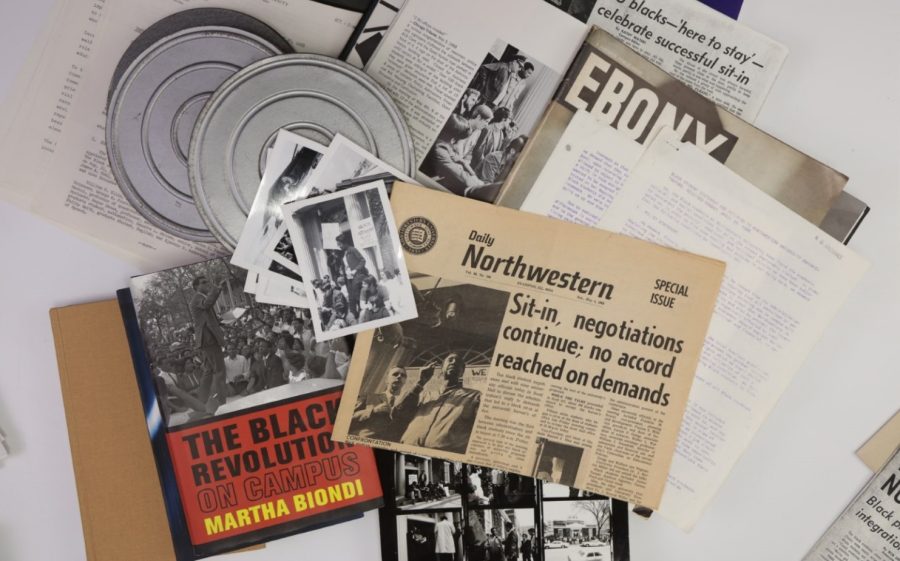African American Studies department commemorates 50th anniversary
Photo courtesy of Northwestern University Libraries
Charla Wilson, archivist for the Black experience, displayed clips of student media when discussing the history of the African American Studies department Saturday.
May 22, 2022
After more than 100 students took over Northwestern’s Bursar’s Office in 1968, the University made the May 4th Agreement, acknowledging activists’ demands to improve Black student life and recognizing “the importance of expanding studies of Black history and Black culture.”
On Saturday, the African American Studies department commemorated its 50th anniversary in a daylong celebration that included three panel discussions, a montage of video messages from past African American Studies students and a keynote address by Comedian Ziwe Fumudoh (Communication ’14).
Charla Wilson, archivist for the Black experience, said while the department was officially established and approved by the Board of Trustees in October 1971, its early years were tumultuous. The department’s first chair, Lerone Bennett, resigned shortly after accepting the position because NU did not give him enough autonomy in hiring decisions, Wilson said.
For Members Only, NU’s Black student union, petitioned for Bennet’s rehiring, boycotting department courses and hosting a press conference at Evanston’s Second Baptist Church.
“After those initial years, we see the department gain stability and expand its faculty and course offerings,” Wilson said. “A major shift occurred when the department submitted a proposal to offer an African American Studies major.”
Since the establishment of the major in 1982, Department Chair Mary Pattillo said 270 African American Studies major and minor students have graduated. It has also granted 29 doctoral degrees since admitting its inaugural cohort in 2006, Patillo said.
The celebration’s theme, “Extending Our Reach,” seeks to commemorate the impact current and former African American Studies students have had, she added.
“(Students) take the ideas discussed and debated in our classrooms, and they take them to their friends. They take them to their homes, to their communities,” Patillo said. “African American Studies majors, minors and Ph.D students become human rights activists, journalists, philanthropists, doctors, bankers, youth counselors, CEOs, artists and teachers and professors.”
While the first panel focused on the department’s beginnings, the second and third invited alumni to reflect on their experiences at NU and share ideas for the department’s continued improvement.
Poet and author Tara Stringfellow (Weinberg ’07) said her education in African American studies has influenced her writing and daily interactions.
“I really don’t think I could function as a Black woman in America and not burn it down if it had not been for this program,” Stringfellow said. “Even when something racist happens to me, I sit there in the moment … I’m like, ‘What is happening here? And how can I use this in a story?’ It gave me a way to view the world critically.”
Eliza Gonring (SESP ’21), a coordinator for the Prison + Neighborhood Education Project, said she wished the department had focused more on Black queer history and the non-liberal extremes of Black political thought, including Black anarchism, Marxism and internationalism.
“I think some things that would potentially be difficult for the department itself to wrestle with (are) colorism, fatphobia — the things that not only should we be learning about in classes, but addressing structurally within the department,” Gonring added.
Fumudoh, who interviews public figures about race and politics in her eponymous show, said she has used her degree in African American Studies and Radio, Television, and Film “within an inch of its life” in her career.
In response to a question about microaggressions she faced at NU, Fumudoh said when she started out as a math major, she often found her peers would second guess her answers. This led her to African American Studies, she said, because she did not want to contend with “a lifetime” of people undermining her due to her race and gender.
“What I really appreciated about that experience studying African American Studies at Northwestern was that it really opened my eyes,” she said. “(It) allowed me to create this show that I have on Showtime, where I get to interact and investigate racial hierarchies in America.”
Email: [email protected]
Twitter: @maiapandey
Related Stories:
— “Black House is back”: 1914 Sheridan Rd. reopens after more than two years of renovation
— New Black House mural, “Undivided Legacy,” focuses on Black past, present and future


